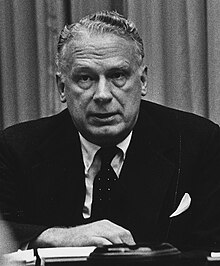
Back جورج بال (دبلوماسي) Arabic George Wildman Ball German جرج بال (دیپلمات) Persian George Ball Finnish George Ball (diplomate) French ג'ורג' בול (דיפלומט) HE George Wildman Ball Italian George Ball (diplomaat) Dutch George Ball NB George Wildman Ball Portuguese
George Ball | |
|---|---|
 Ball in 1966 | |
| 7th United States Ambassador to the United Nations | |
| In office June 26, 1968 – September 25, 1968 | |
| President | Lyndon B. Johnson |
| Preceded by | Arthur Goldberg |
| Succeeded by | James R. Wiggins |
| 23rd United States Under Secretary of State | |
| In office December 4, 1961 – September 30, 1966 | |
| President | John F. Kennedy Lyndon B. Johnson |
| Preceded by | Chester Bowles |
| Succeeded by | Nicholas Katzenbach |
| 3rd Under Secretary of State for Economic Affairs | |
| In office February 1, 1961 – December 3, 1961 | |
| President | John F. Kennedy |
| Preceded by | C. Douglas Dillon |
| Succeeded by | Thomas C. Mann |
| Personal details | |
| Born | George Wildman Ball December 21, 1909 Des Moines, Iowa, U.S. |
| Died | May 26, 1994 (aged 84) New York City, New York, U.S. |
| Political party | Democratic |
| Education | Northwestern University (BS, JD) |
George Wildman Ball (December 21, 1909 – May 26, 1994) was an American diplomat and banker. He served in the management of the US State Department from 1961 to 1966 and is remembered by most as the only cabinet member of Presidents John F. Kennedy and Lyndon B. Johnson who was a major dissenter against the escalation of the Vietnam War. Ball advised against deploying U.S. combat forces, as he believed it would lead the United States into an unwinnable war and result in a prolonged conflict. Instead, he argued that the United States should prioritize allocating its resources to Europe rather than engaging in expensive military ventures. However, he refused to publicize his doubts.
He helped determine American policy regarding trade expansion, Congo, the Multilateral Force, de Gaulle's France, Israel and the rest of the Middle East, and the Iranian Revolution.